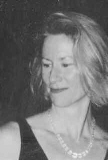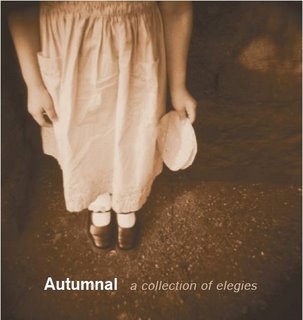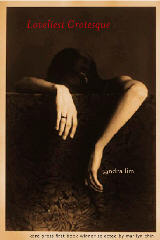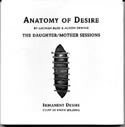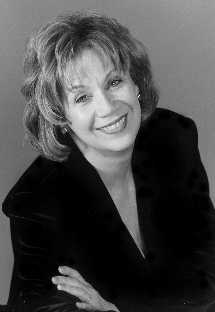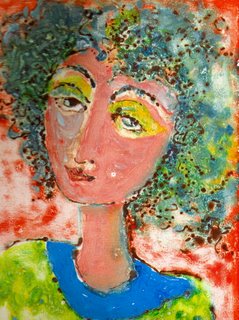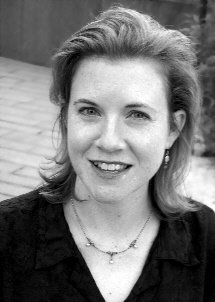
Blogger:
Elline LipkinFirst Book Award Winner
for
The Errant Threadyes! radiant lyre speak to me
become a voice— Sappho, fragment 118
messenger of spring
nightingale with a voice of longing
— Sappho, fragment 136
A friend once observed to me that every woman poet has a Persephone poem or a Penelope one. At the time I laughed because I had, in fact, been working on a Penelope poem myself. The statement seemed strikingly true, although my own response at the time was to say that I had just written a Philomela poem, a lesser-known character in the Greek and Roman pantheon, but one whose silenced voice, paradoxically, spoke the loudest to me.
Philomela’s tale is a grisly one: rape, mutilation, infanticide, attempted murder. Whenever I’ve borrowed her name as on-line pseudonym I invariably receive correspondence back asking why I would choose such a negative moniker. Although I see her story as one of great violence against women, my instinctive reaction has always been to understand her tale as one also of affirmation -- that women will continue to make art despite the violation they endure, and in fact, this kind of transgression can serve as a powerful spur towards writing.
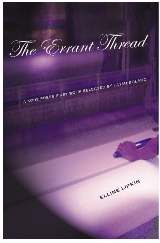
When I first learned about the myth of Philomela during a graduate class, I was transfixed. Its story of silence then speaking, the literal tongue cut from a mouth then serving as an excision from language as symbolic tongue was startling. I was glad to read about how the voice of Philomela was later restored into song, the vocation of the poet, as her presence as the nightingale reappears throughout literature, a ghostly note that invokes her story, although she remains forever outside a window or a door.
Philomela’s defiance within the story has always particularly striking. She specifically tells Tereus she will speak and not be shamed by what he’s done to her. Recognition of her determination is what leads Tereus to the retaliatory act of cutting out her tongue, thereby admitting the power of her (potential) speech. Philomela’s last literal word, “father,” perhaps a plea, perhaps a symbolic severing from patriarchal language, falls from her tongue as it bounces on the ground, writhing like a severed snake. Her violated status banishes her from an acceptable role for a young woman, and in parallel, she is moved literally to the exile of a small hut in the woods. From here her exemption from conventional expectation gives rise to her artistry. Although she loses her literal voice, she finds a way to insist upon her story. Her innovation is born of necessity as she turns to the loom, a traditional tool of both utility and art.
Philomela’s tale has continued to move me on many levels. I am always struck by her resourcefulness and sheer determination, followed by her sister’s complicit understanding, then absolute loyalty, and then extreme sacrifice. The goddess’s intervention adds a happier ending to the tale, but the nightingale’s voice, part song, part plaint, as it reappears throughout the canon of literature, is an ambivalent note, evoking both beauty and melancholy. After I began to research the history of this myth, I came to view many of its essential elements as a kind of controlling metaphor for my own poetic awakening — a need to broaden, although not break, my understanding of the poetic canon as situated within a patriarchal framework linked with an active turn towards a legacy of writing by women, accompanied by vigorous thinking about issues surrounding gendered writing and speaking. While I view my education as a poet as equally informed by both male and female poets and critics, I came to realize early on that many of my concerns as a poet and a critic are deeply connected to what it means to be a woman writer. I want to examine carefully the implications of gender; to think about the ways women poets both constitute their own legacy and also compose the larger canon; what it means for me to write from experiences gendered as female; what points of contact I feel with a tradition which is still burgeoning.
Philomela’s name is often invoked, either directly or by the presence of the nightingale, throughout Western literature. Versions of her story abound from poets as far ranging as Ovid, Chaucer, Sophocles, Shakespeare, Matthew Arnold, Edgar Lee Masters, Sir Philip Sidney, and T.S. Eliot. After first hearing of her weaving, I quickly wrote my own version, “Philomela’s Tongue,” a poem that, as rarely occurs, came out in virtually one sitting. In this poem I focus on Philomela’s determination as reflected in the line, “But she lost none of her nerve.” Despite her mutilation, Philomela is empowered; she transmutes her terrible loss into a gain. In an allusion to the many women poets who write about Penelope, I mention their alliance with the line “Purposed as Penelope, the weft / wept her story, the warp reinforced grief.” At the poem’s end I view her writing, hence her weaving, conflated with her voice, transforming her unheard scream into a text. In a later companion poem, “Tereus Speaks” I realized I wanted to try and consider what his motivations could have been, where his voice might be in the equation as well.
I see Philomela’s tale as one of ultimate triumph, and if a troubling initiation, one that spurs her artistic creation. Separated permanently from codified expectation (virgin, chaste sister) she lives outside a space of patriarchal utility and thereby comes into her own power. I view Philomela as inhabiting an alternate space which frees her and allows both sisters access to what would otherwise be transgressive: pure anger, unabashed desire for revenge, and the steel will with which to act on their intentions.
Finding a language and a tradition which to inhabit is central to my quest in discovering my own voice as a poet. Exploration of what it means to claim words and to claim a context arises within The Errant Thread in various guises. I am interested in what it means to write as as a contemporary woman and I am interested in language itself, exploring the inventive things it can do when words lift from literal into metaphoric meaning. I see this as a place of endless possibility which I approach with recurring faith.
